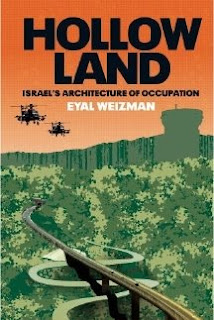
Indeed, beyond their physical reality, the territories of Israel/Palestine have constituted a schematic description of a conceptual system whose properties have been used to understand other geopolitical problems. The ‘Intifada’ unfolding in Iraq is a part of an imaginary geography that Makram Khoury-Machool called the ‘Palestinization of Iraq’. Yet, if the Iraqi resistance is perceived to have been ‘Palestinized’, the American military has been ‘Israelized’.
Furthermore, both the American and Israeli militaries have adopted counter-insurgency tactics that increasingly resemble the guerrilla methods of their enemies.
When the wall around the American Green Zone in Baghdad looks as if it had been built from left-over components of the West Bank Wall;
when ‘temporary closures’ are imposed on entire Iraqi towns and villages and reinforced with earth dykes and barbed wire;
when larger regions are carved up by road blocks and checkpoints;
when the homes of suspected terrorists are destroyed, and ‘targeted assassinations’ are introduced into a new global militarized geography
...it is because the separate conflicts now generally collected under the heading of the ‘war on terror’ are the backdrop to the formation of complex ‘institutional ecologies’ that allow the exchange of technologies, mechanisms, doctrines, and spatial strategies between various militaries and the organizations that they confront, as well as between the civilian and the military domains.
Eyal Weizman. Hollow Land: Israel’s Architecture of Occupation (Verso, London, 2007), p. 10.this is what i'm presently reading... can't help but make the connections b/w current events in Gaza, my recent posts on Israeli incursions into the Occupied Territories almost 7 years ago, and the links the author makes in the excerpt above (and i allude to in the previous post) b/w American and Israeli approaches to the 'War on Terror.'
note: i've broken up the excerpt for easier reading... it's all one long paragraph in the book.
Sounds like a very interesting book, one that I would like to pick up. Wish that everything could be simplified. If we could all sit down and just talk without the political and media implications. Just talk and share. There is so much that is similar, but the focus is always on differences. Always differences. Not that differences are bad, they give us the richness in the world. But we (as Americans, Westerners, hell all people) need to have more willingness to understand and appreciate differences. Don't know why, but so many people are unwilling to earnestly listen to alternative viewpoints. Maybe I'm still naive and optimistic that this type of discussion/sharing would make a difference. Just wish the situation was somehow different, that violence and separation weren't utilized as they are, that we didn't lose the beauty of all of our cultures by branding each other they way that we do. Maybe naive is better than the alternative.
ReplyDelete"complex ‘institutional ecologies’ that allow the exchange of technologies, mechanisms, doctrines, and spatial strategies"
ReplyDeletethey mimic the structure, but not the purpose. these networks are not there for living beings to take care of one another. they do not build relationships. they don't hold life, they aren't sustainable. they collapse in on themselves and weaken the centers of everything connected to them. a physical manifestation of distorted thinking.
anonymous,
ReplyDeletethanks for writing! if by 'naive' you mean without ego and without prejudice... without the desire to control, and with the willingness and openness to listen, learn and change... then i'm with you. that kind of naivety would be powerful.
i'm also with you on the power of dialogue... the 'discussion/sharing' that you refer to. indeed, that would make a difference. naivety coupled with dialogue. seeing and hearing the other within you, and you within the other.
i'm having an I-Thou moment here... have you heard of Martin Buber?
http://en.wikipedia.org/wiki/Martin_Buber
austrian-jewish philosopher and cultural zionist. his ideas on dialogue, relationship and community are profound... to say nothing of their theological and political implications.
peace :)
mohamad
indeed, ellen, it's all about intention and purpose... let me ask you this:
ReplyDeleteif the intention of a few groups within that structure changes, and we assume that these groups are well placed (not necessarily at the top) to enact change, can they then wield this same structure for good? i.e. to care for one another and be in relationship.
peace :)
mohamad
"can they then wield this same structure for good?"
ReplyDeletethe same physical structure? or the networks both visible and invisible? the latter i think begins to change as soon as intention changes. after that, i think physical structure starts to be adapted (or just plain neglected) to suit the new intention. i'm often amazed at how creative people can be in adapting their physical environment when they focus intently on a new future.
well said :)
ReplyDelete